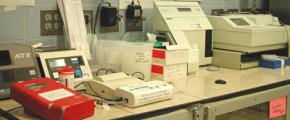Visionary Leaves His Imprint in Veterinary ICUs

Visionary Leaves His Imprint in Veterinary ICUs
The Washington Post has an interesting obituary online. The obituary of Dr. Max Harry Weil credits this physician with helping to invent the intensive care unit (ICU) in human hospitals. I wonder if he would be surprised to know his work is visible in the intensive care unit at The Animal Medical Center and many other large veterinary hospitals as well?
Dr. Weil’s precursor to the ICU we know today was a “shock ward” with four beds in 1958. The AMC’s ICU has 19 “beds” and manages pets in shock from serious trauma, such as automobile accidents, on a daily basis.
Dr. Weil’s vision was for all the necessary equipment and expertise required by seriously ill patients to be housed together in a single location. He coined the term “critical care” to describe both the hospital space and the expertise. To meet the needs of his critically ill patients, he developed the rolling “crash cart” holding the equipment and drugs necessary for managing cardiac arrest. The AMC has multiple crash carts throughout the hospital so one is always near a pet in need.
In the AMC’s ICU, there is a small “stat lab” where we measure biological parameters which can change on a minute to minute basis. This stat lab allows the ICU staff to measure blood oxygen levels, red blood cell counts, liver and kidney function, blood sugar and the blood’s ability to clot 24 hours a day, 7 days a week. Ready access to monitoring allows the critical care staff to change treatments in response to changes in the pet’s condition.
In keeping with Dr. Weil’s vision of critical care, the AMC ICU also includes a highly trained staff specializing in the care of critically ill patients. Veterinarians who are specialists in the management of critically ill patients are board certified by the American College of Veterinary Emergency and Critical Care.
We also have licensed veterinary technicians, who are certified by the North American Veterinary Technician Academy in emergency and critical care.
Pets and veterinarians everywhere owe a debt of gratitude to Dr. Max Harry Weil for his vision of critical care, which helps us to take better care of our patients every day.
Photos: Ann Hohenhaus, DVM
________________________________________________________
This may also be found in the “Tales from the Pet Clinic” blog on WebMD.com.
For over a century, The Animal Medical Center has been a national leader in animal health care, known for its expertise, innovation and success in providing routine, specialty and emergency medical care for companion animals. Thanks in part to the enduring generosity of donors, The AMC is also known for its outstanding teaching, research and compassionate community funds. Please help us to continue these efforts. Send your contribution to: The Animal Medical Center, 510 East 62nd Street, New York, NY 10065. For more information, visit www.amcny.org. To make an appointment, please call 212.838.7053.


































